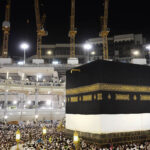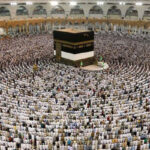
“If you do not support the Prophet, it suffices that truly God supported him when those who disbelieve expelled him from Makkah. He was the second of two alone when they were hiding in the Cave of Thawr. Then he said to his companion (Abu Bakr, later the first of the rightly-guided caliphs): Do not grieve, for, indeed, God is with us…”(Q9V40)
Today is 3rd Muharram 1445 after the Hijrah – the migration of Prophet Muhammad from Makkah to Madinah. This event was commemorated all around the Muslim world three days ago.
It happened that one thousand, four hundred and forty-five years ago, history stood witness to the emigration of 70 men and women from Makkah to Madinah. In the morning of September 24, 622 CE, Prophet Muhammad (Upon him be peace and blessing), accompanied by his bosom friend, confidant and follower, Abu Bakr al-Siddiq, having slipped away under the cover of the night, having taken untrodden paths and having escaped the inhumanity of the aristocratic powers of Makkah (his homeland) eventually arrived the safe and secure earth-land of Madinah.
This event is usually celebrated all over the Muslim world the same way it was celebrated by the second Caliph in Islamic history, Umar b. Khatab. It was the latter who began to date the undated in Muslim reality; it was B. Khattab who first started the usage of the date of emigration of the Muslims from Makkah to Madinah in the affairs of the Islamic state. The successful arrival of the Prophet of Islam from Makkah to Madinah after thirteen years of persecution in the hands of the Makkan unbelievers known as Hijrah has since then been commemorated on a yearly basis by the Muslim world.
But the pertinent question is of what value to the humanity today is the commemoration of an event that took place more than 16 centuries ago? Why does Muslim world continue to talk about and reengage Hijrah?
The Muslim world usually “celebrates” the Hijrah partly in its attempt to ensure the dated becomes undated in Islamic history. Muslims mark the Hijrah in order to prevent the hijrah from being conclusive or teleological.
They reread the Hijrah as a community and they endeavour to derive meaning and meaning of meaning of the event based on their conviction that such an important event should not be viewed in the past perfect but in the past-present. They do this based on the realisation that Muslims are destined and confined into that space in a world history where if they fail to read and reread the event, they might actually have failed in reading their lives through the prism of the Qur’an. An unexamined life, teachers would counsel, is not worth living.
Exploring the signification of Hijrah in modern time can be approached from two perspectives: contemporary Muslim existential reality as well as historical-theological purview.
In the realm of the spiritual, the Hijrah, it has been argued, was all about duty and sacrifice. In the realm of the material and the human, it was an adventure. The first precedes the second both in importance and sequence. The Hijrah was also all about forsaking and repossessing. This is evidenced in the individual and communal realities of those who left what made them humans behind in Makkah in order for them to become greater humans in Madinah. It was a template for the emergence of new figures in history through whose actions, the world today now counts the existence of over 1.8 billion Muslims all around the world.
The Hijrah, while referencing motifs of forsaking and repossessing, amplifies the secret codes for the attainment of excellence in life. It means to be deprived of the world is not like the same thing as forsaking the world. Both occurred with reference to the 70 individuals who made that journey during the first Hijrah, the second was relevant to those who willingly left Makkah in order to populate Madinah.
The Hijrah as a motif therefore essays the world as operating on a scale: it is either you are deprived of the world or you are made to forsake the world. In both instances, the world is meant to be forsaken not coveted. But the irony lies in the fact that those who forsake the world usually have the world come to them pleading that it be possessed; those who covet the world might or might never gain it; those who excessively covet the world are more likely going to lose it and lose their souls.
Furthermore, the Hijrah had to do with the departure from a space: the departure from Makkah. The Prophet and his companions not only left Makkah in person, but also left Makkah behind. To leave Makkah behind meant leaving the city with its insuperable odour of greed, covetousness, self-conceitedness, oppression of the poor, and sexploitation of women. By leaving Makkah, the Prophet was indirectly calling attention to the existence of the “Makkahs” of today: the “Makkah” in the North and South of Nigeria; the “Makkahs” in Africa and Asia; the “Makkahs” which are awaiting the emigration of humanity; the “Makkahs” of corruption in the various houses of Assembly and the corporate world; the “Makkah” in the various commercial and transactional dealings where sharp practices are the order of the day; the Makkah in the banking sector where directors feast on the meagre deposits of pauperized Nigerians; the “Makkah” in local government houses where council allocations are “cancelled” on a monthly basis.
This second interpretation of the commemoration of Hijrah became relevant in Nigeria last Wednesday as the National Chairman of the Hijrah Organisation of Nigeria, Professor Badmaus Olarenwaju Yusuf called on President Bola Ahmed Tinubu to address inflation in the prices of food and other commodities in the country.
Speaking during the 1445 A.H. celebrtaion held in Ilorin, Yusuf said the situation had devastated the socio-economic welfare and development of the populace.
“The current increase in the inflation index has led many families into untold hardship; they can no longer meet obligations.
“With the recent increase of pump price from N515 to N617 per litre, the economic propensity of Nigerians to buy petrol is low which is serious for our economic development as a nation.
“Our major request from the state and federal governments is to address these prevalent situations facing us frequently which include food inflation and shortage.”
The commemoration in Nigeria will contiune to make no impact as long as political class continues to promote and display egregious obscenity at the expense of downtrodden masses.
Classical example is the supplementary budget of N819.5 billion just passed by the National Assembly in which N70 billion was earmarked to cater for members of the parliament, while another N40 billion was inserted to provide 465 Sport Utility Vehicles for Senate and House of Representatives members even though 54 per cent of the country’s youth is jobless while 133 million Nigerians are multi-dimensionally poor.
It is important that political leadership in Nigeria should take in the lessons of Hijrah commemoration and uphold the constitutional responsibility of governance which is mainly about the welfare and security of the governed.
Welcome to new Hijrah year of 1445! May the Almighty continue to guide and bless both the leadership and followership.
• Dr. Alabi Garba is a member of staff and Chief Imam of The Guardian













